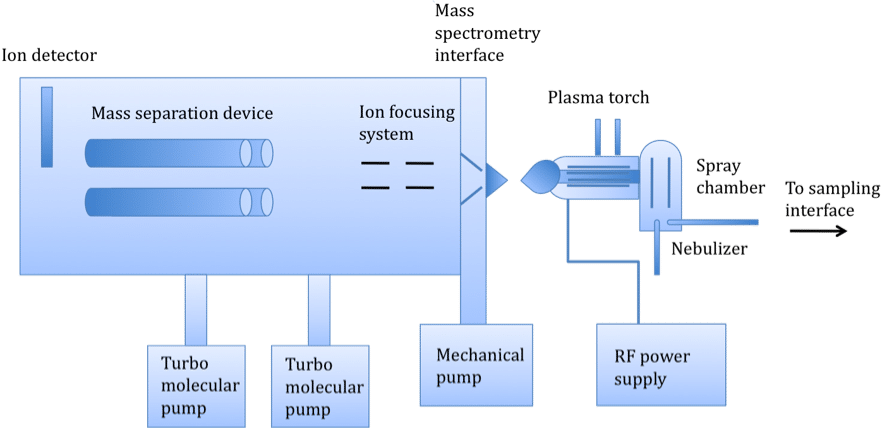Accurate and reliable metal analysis is essential for various industries, from environmental monitoring to pharmaceuticals and materials science. One of the most powerful tools for this purpose is Inductively Coupled Plasma Mass Spectrometry (ICP-MS).
This advanced analytical technique combines high sensitivity, precision, and the ability to detect trace and ultra-trace levels of metals and non-metals in complex matrices. Here, we’ll explore the fundamentals of ICP-MS and why it has become a gold standard for accurate metal analysis.
What is ICP-MS?
ICP-MS is a sophisticated analytical method that uses a plasma source to ionize the sample and a mass spectrometer to detect and quantify the ions based on their mass-to-charge ratios. The technique is renowned for its ability to measure elements at parts-per-trillion (ppt) levels, making it ideal for applications requiring high sensitivity.
Core Principles of ICP-MS
To understand ICP-MS, it’s essential to break it down into its three fundamental stages: sample introduction, ionization, and mass analysis.
- Sample Introduction
- The sample, typically in liquid form, is introduced into the system using a nebulizer. This device converts the liquid sample into a fine aerosol, which is then carried into the plasma by a stream of argon gas.
- Solid samples can also be analyzed after digestion or by using laser ablation for direct introduction.
- Ionization in the Plasma
- The aerosol enters the inductively coupled plasma, a high-temperature ionization source created by a radiofrequency (RF) coil that excites argon gas.
- The plasma operates at temperatures exceeding 6000°C, effectively ionizing the sample’s elements into positively charged ions.
- Mass Analysis
- The ionized sample is then directed into a mass spectrometer, which separates ions based on their mass-to-charge ratio (m/z).
- Quadrupole mass spectrometers, time-of-flight (TOF), or sector field analyzers are commonly used, each offering specific advantages in speed, accuracy, or resolution.
- Detection
- The separated ions are detected and quantified by a detector, such as an electron multiplier, which measures the intensity of each ion signal. This intensity correlates to the concentration of the corresponding element in the sample.
Key Features and Advantages of ICP-MS
- High Sensitivity and Accuracy
- ICP-MS can detect elements at incredibly low concentrations, often in the ppt range, ensuring precise results for trace metal analysis.
- Wide Dynamic Range
- It allows for the simultaneous quantification of elements present at vastly different concentrations in a single analysis.
- Isotopic Analysis
- The ability to distinguish between isotopes of the same element makes ICP-MS valuable for applications like radiogenic dating and tracing environmental pollutants.
- Minimal Interference
- Advanced features like collision/reaction cells minimize interference from polyatomic ions, enhancing analytical accuracy.
Applications of ICP-MS
ICP-MS is indispensable across various fields:
- Environmental Testing
- Monitoring trace metals in water, soil, and air to ensure compliance with environmental regulations.
- Pharmaceutical Quality Control
- Ensuring the purity and safety of drugs by detecting trace metal contaminants.
- Food and Beverage Industry
- Testing for toxic metals such as lead, cadmium, and arsenic in food and beverages.
- Material Science
- Analyzing impurities in metals and alloys for quality assurance.
- Geochemical and Biomedical Research
- Investigating elemental composition in biological samples and geological specimens.
Limitations and Considerations
While ICP-MS is a powerful tool, it does have some limitations:
- High Cost: The initial investment and maintenance costs are substantial.
- Complex Sample Preparation: Certain samples may require extensive digestion or dilution to prevent matrix effects.
- Operator Expertise: The technique demands skilled operators for setup, calibration, and interpretation of results.
Conclusion
Inductively Coupled Plasma Mass Spectrometry is an indispensable tool for accurate and reliable metal analysis across a range of industries. Its unparalleled sensitivity, precision, and versatility make it a cornerstone of modern analytical chemistry.
While the technology comes with its complexities, the benefits far outweigh the challenges, especially when the highest level of accuracy is required. By understanding its core principles, laboratories and industries can leverage ICP-MS to achieve superior analytical performance, ensuring quality, safety, and compliance in their respective fields.

















